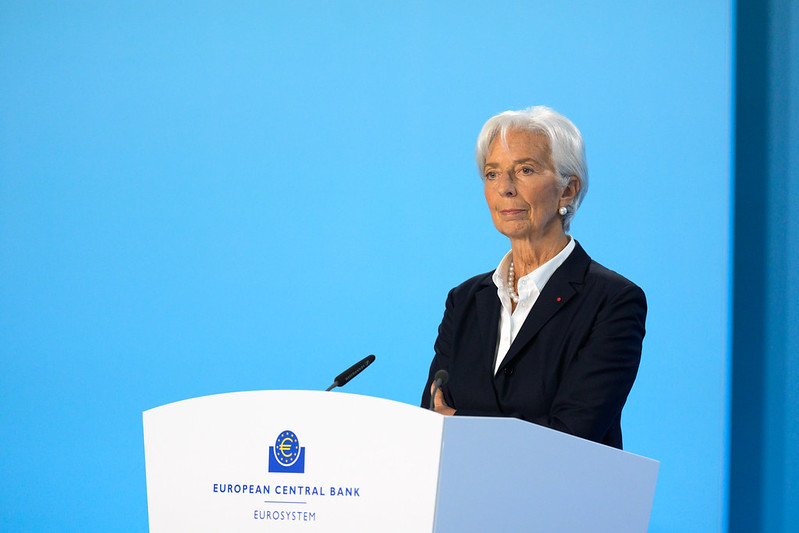The central rate of the Slovak koruna has been revalued
At the request of the Slovak authorities, the ministers of the euro-area Member States of the European Community, the European Central Bank and the ministers and the central bank governors of Denmark, Estonia, Latvia, Lithuania, and Slovakia have decided, by mutual agreement, following a common procedure involving the European Commission and after consultation of the Economic and Financial Committee, to adapt the central rate of the Slovak koruna in the Exchange Rate Mechanism II (ERM II), said the ECB in a statement.rnrnThe central rate of the Slovak koruna has been revalued by 17.6472 percent. The new central rate of the koruna isrnrn1 euro = 30.1260 koruna.rnrnThe standard fluctuation band of plus or minus 15 percent continues to be observed around the central rate of the Slovak koruna.rnrnThe revaluation of the central rate of the Slovak koruna is justified by ongoing improvements in underlying fundamentals. It will support the authorities in maintaining macroeconomic stability. The revaluation is based on a firm commitment by the authorities to pursue appropriate supportive policies, aimed in particular at maintaining price stability in a sustainable manner, underpinning external competitiveness and strengthening economic resilience.rnrnThese policies include: strengthening the pace of fiscal adjustment in structural terms in 2008 and ensuring an annual average structural adjustment of at least 0.5 % of GDP from 2009 onwards, in line with the Council opinion adopted on 12 February 2008 on the updated convergence programme of Slovakia; adopting, if necessary, an even tighter fiscal stance should additional inflationary pressures arise; promoting wage developments which reflect labour productivity growth, in particular in the public sector; further structural reforms to enhance the institutional framework in the areas of education and R&D, to foster the better functioning of labour markets (in particular by tackling the combination of a high structural unemployment rate, regional disparities and emerging skill mismatches) and to improve the business environment in order to raise productivity growth. The Slovak authorities will ensure an efficient price setting in regulated industries, in particular in the energy sector. They will continue to closely monitor financial stability to prevent relaxation of credit standards and to ensure proper accounting for credit risks. The authorities, together with the responsible EU bodies, will closely monitor macroeconomic and exchange rate developments. The authorities commit to strengthen the policy stance as warranted.rnrnThis decision is without prejudice to the possible decision of the Council pertaining to Article 122(2) of the Treaty.rnrnThe new compulsory intervention rates in the ERM II have been set at 34.6449 and 25.6071 and are immediately effective at the opening of the foreign exchange markets on 29 May 2008.rn
Comentarii
Nu există comentarii pentru această știre.
Adauga un comentariu
Alte stiri din categoria: Noutati BCE
Dobanda la euro scade la 2,25%
Banca Centrala Europeana (BCE) a scazut dobanda de referita (deposit rate - facilitatea de depozit) cu un sfert de punct, la 2,25%, ca efect al razboiului comercial declansat de presedintele... detalii
Acord intre BCE si BNR pentru supravegherea bancilor
• BCE semnează Memorandumul de înțelegere cu autoritățile naționale competente din șase state membre ale UE care nu participă la supravegherea bancară europeană. • Țările care fac obiectul Memorandumului sunt Cehia, Danemarca, Polonia, România, Suedia și Ungaria.• Memorandumul consolidează cooperarea în materie de supraveghere prin partajarea de informații și promovează o cultură comună în domeniul supravegherii.Banca Centrală Europeană (BCE) a încheiat un Memorandum de înțelegere multilateral cu autoritățile naționale competente (ANC) ale celor șase state membre ale UE care nu participă la supravegherea bancară europeană, conform unui comunicat de presa, in care se adauga:Memorandumul va asigura un cadru prin intermediul căruia Cehia, Danemarca, Polonia, România, Suedia și Ungaria vor face schimb de informații și își vor coordona activitățile de supraveghere.Acordul urmărește să intensifice în continuare cooperarea în materie de supraveghere la nivel european, pe fundamentul... detalii
Banca Centrala Europeana (BCE) explica de ce a majorat dobanda la 2%
Banca Centrala Europeana (BCE) explica de ce a majorat dobanda la 2%, in cadrul unei conferinte de presa sustinute de Christine Lagarde, președinta BCE, si Luis de Guindos, vicepreședintele BCE.Iata... detalii
BCE creste dobanda la 2%, dupa ce inflatia a ajuns la 10%
Banca Centrala Europeana (BCE) a majorat dobanda de referinta pentru tarile din zona euro cu 0,75 puncte, la 2% pe an, din cauza cresterii substantiale a inflatiei, ajunsa la aproape 10% in septembrie, cu mult peste tinta BCE, de doar 2%.In aceste conditii, BCE a anuntat ca va continua sa majoreze dobanda de politica monetara.De asemenea, BCE a luat masuri pentru a reduce nivelul imprumuturilor acordate bancilor in perioada pandemiei coronavirusului, prin majorarea dobanzii aferente acestor facilitati, denumite operațiuni țintite de refinanțare pe termen mai lung (OTRTL).Comunicatul BCEConsiliul guvernatorilor a decis astăzi să majoreze cu 75 puncte de bază cele trei rate ale dobânzilor reprezentative ale BCE. Prin această majorare substanțială a ratelor dobânzilor pentru a treia oară consecutiv, Consiliul guvernatorilor a înregistrat progrese considerabile în procesul de retragere a măsurilor acomodative de politică monetară. Consiliul... detalii
 Dobânda pe termen lung a continuat să scadă in septembrie 2022. Ecartul față de Polonia și Cehia, redus semnificativ
Dobânda pe termen lung a continuat să scadă in septembrie 2022. Ecartul față de Polonia și Cehia, redus semnificativ
 Rata dobanzii pe termen lung pentru Romania, in crestere la 2,96%
Rata dobanzii pe termen lung pentru Romania, in crestere la 2,96%
 BCE recomanda bancilor sa nu plateasca dividende
BCE recomanda bancilor sa nu plateasca dividende
 Modul de functionare a relaxarii cantitative (quantitative easing – QE)
Modul de functionare a relaxarii cantitative (quantitative easing – QE)
 Dobanda la euro nu va creste pana in iunie 2020
Dobanda la euro nu va creste pana in iunie 2020
 BCE trebuie sa fie consultata inainte de adoptarea de legi care afecteaza bancile nationale
BCE trebuie sa fie consultata inainte de adoptarea de legi care afecteaza bancile nationale
 BCE a publicat avizul privind taxa bancara
BCE a publicat avizul privind taxa bancara
 BCE va mentine la 0% dobanda de referinta pentru euro cel putin pana la finalul lui 2019
BCE va mentine la 0% dobanda de referinta pentru euro cel putin pana la finalul lui 2019
 ECB: Insights into the digital transformation of the retail payments ecosystem
ECB: Insights into the digital transformation of the retail payments ecosystem
 ECB introductory statement on Governing Council decisions
Vezi toate stirile
ECB introductory statement on Governing Council decisions
Vezi toate stirile
Criza COVID-19
- In majoritatea unitatilor BRD se poate intra fara certificat verde
- La BCR se poate intra fara certificat verde
- Firmele, obligate sa dea zile libere parintilor care stau cu copiii in timpul pandemiei de coronavirus
- CEC Bank: accesul in banca se face fara certificat verde
- Cum se amana ratele la creditele Garanti BBVA
Topuri Banci
- Topul bancilor dupa active si cota de piata in perioada 2022-2015
- Topul bancilor cu cele mai mici dobanzi la creditele de nevoi personale
- Topul bancilor la active in 2019
- Topul celor mai mari banci din Romania dupa valoarea activelor in 2018
- Topul bancilor dupa active in 2017
Asociatia Romana a Bancilor (ARB)
- Băncile din România nu au majorat comisioanele aferente operațiunilor în numerar
- Concurs de educatie financiara pentru elevi, cu premii in bani
- Creditele acordate de banci au crescut cu 14% in 2022
- Romanii stiu educatie financiara de nota 7
- Gradul de incluziune financiara in Romania a ajuns la aproape 70%
ROBOR
- ROBOR: ce este, cum se calculeaza, ce il influenteaza, explicat de Asociatia Pietelor Financiare
- ROBOR a scazut la 1,59%, dupa ce BNR a redus dobanda la 1,25%
- Dobanzile variabile la creditele noi in lei nu scad, pentru ca IRCC ramane aproape neschimbat, la 2,4%, desi ROBOR s-a micsorat cu un punct, la 2,2%
- IRCC, indicele de dobanda pentru creditele in lei ale persoanelor fizice, a scazut la 1,75%, dar nu va avea efecte imediate pe piata creditarii
- Istoricul ROBOR la 3 luni, in perioada 01.08.1995 - 31.12.2019
Taxa bancara
- Normele metodologice pentru aplicarea taxei bancare, publicate de Ministerul Finantelor
- Noul ROBOR se va aplica automat la creditele noi si prin refinantare la cele in derulare
- Taxa bancara ar putea fi redusa de la 1,2% la 0,4% la bancile mari si 0,2% la cele mici, insa bancherii avertizeaza ca indiferent de nivelul acesteia, intermedierea financiara va scadea iar dobanzile vor creste
- Raiffeisen anunta ca activitatea bancii a incetinit substantial din cauza taxei bancare; strategia va fi reevaluata, nu vor mai fi acordate credite cu dobanzi mici
- Tariceanu anunta un acord de principiu privind taxa bancara: ROBOR-ul ar putea fi inlocuit cu marja de dobanda a bancilor
Statistici BNR
- Deficitul contului curent, în creștere cu 82% pe T1 2025
- Deficitul contului curent, creștere cu 16% în ianuarie 2025
- Deficitul contului curent, aproape 30 miliarde euro în 2024
- Deficitul contului curent, aproape 20 miliarde euro după primele nouă luni
- Deficitul contului curent, aproape 18 miliarde euro după primele opt luni
Legislatie
- Decizia nr.105/2007 privind raportarea la Biroul de Credit
- Legea nr. 311/2015 privind schemele de garantare a depozitelor şi Fondul de garantare a depozitelor bancare
- Rambursarea anticipata a unui credit, conform OUG 50/2010
- OUG nr.21 din 1992 privind protectia consumatorului, actualizata
- Legea nr. 190 din 1999 privind creditul ipotecar pentru investiții imobiliare
Lege plafonare dobanzi credite
- Care este dobanda maxima la un credit IFN?
- BNR propune Parlamentului plafonarea dobanzilor la creditele bancilor intre 1,5 si 4 ori peste DAE medie, in functie de tipul creditului; in cazul IFN-urilor, plafonarea dobanzilor nu se justifica
- Legile privind plafonarea dobanzilor la credite si a datoriilor preluate de firmele de recuperare se discuta in Parlament (actualizat)
- Legea privind plafonarea dobanzilor la credite nu a fost inclusa pe ordinea de zi a comisiilor din Camera Deputatilor
- Senatorul Zamfir, despre plafonarea dobanzilor la credite: numai bou-i consecvent!
Anunturi banci
- BCR este inchisa vineri, 18 aprilie, si luni, 21 aprilie
- Cererile de transfer de bani prin Whatsapp, Telegram, Messenger sunt fraude
- Un telefon sau mesaj care pare de la banca poate fi frauda
- Cererea unui ajutor in bani poate fi o inselaciune
- Cate reclamatii primeste Intesa Sanpaolo Bank si cum le gestioneaza
Analize economice
- Comerțul, în creștere cu 3,8% pe prima treime a anului
- Prețurile industriale, o nouă scădere în aprilie 2025
- Prognoza de primăvară - creșterea PIB, ajustată în jos până în 2027
- Datoria publică, majorată la 56,3% din PIB în februarie 2025
- Inflația anuală - scădere marginală, la 4,85%
Ministerul Finantelor
- -2,95% din PIB, deficit bugetar după prima treime a anului
- Deficitul bugetar, rezultat slab pe T1 2025
- Deficitul bugetar, din ce în ce mai mare la început de an
- -8,65% din PIB, deficit bugetar pe anul 2024
- Datoria publică, 51,4% din PIB la mijlocul anului
Biroul de Credit
- FUNDAMENTAREA LEGALITATII PRELUCRARII DATELOR PERSONALE IN SISTEMUL BIROULUI DE CREDIT
- BCR: prelucrarea datelor personale la Biroul de Credit
- Care banci si IFN-uri raporteaza clientii la Biroul de Credit
- Ce trebuie sa stim despre Biroul de Credit
- Care este procedura BCR de raportare a clientilor la Biroul de Credit
Procese
- ANPC pierde un proces cu Intesa si ARB privind modul de calcul al ratelor la credite
- Un client Credius obtine in justitie anularea creditului, din cauza dobanzii prea mari
- Hotararea judecatoriei prin care Aedificium, fosta Raiffeisen Banca pentru Locuinte, si statul sunt obligati sa achite unui client prima de stat
- Decizia Curtii de Apel Bucuresti in procesul dintre Raiffeisen Banca pentru Locuinte si Curtea de Conturi
- Vodafone, obligata de judecatori sa despagubeasca un abonat caruia a refuzat sa-i repare un telefon stricat sau sa-i dea banii inapoi (decizia instantei)
Stiri economice
- Inflația anuală în creștere la 5,45%, prin efect de bază
- Comerțul exterior, -11,6 miliarde euro după prima treime a anului
- România, cea mai redusă pondere din UE a persoanelor care lucrează la pensie
- România, tot prima din UE la inflația anuală în aprilie 2025
- Producția industrială, în scădere pe primele trei luni ale anului
Statistici
- România, cel mai rapid proces de motorizare din UE
- Comerțul, în creștere cu 4% pe T1 2025
- România, marginal peste Estonia la inflația anuală
- România, a doua țară din UE ca pondere a salariaților cu venituri mici
- România, pe locul trei în UE la creșterea costului muncii în T2 2024
FNGCIMM
- Programul IMM Invest continua si in 2021
- Garantiile de stat pentru credite acordate de FNGCIMM au crescut cu 185% in 2020
- Programul IMM invest se prelungeste pana in 30 iunie 2021
- Firmele pot obtine credite bancare garantate si subventionate de stat, pe baza facturilor (factoring), prin programul IMM Factor
- Programul IMM Leasing va fi operational in perioada urmatoare, anunta FNGCIMM
Calculator de credite
- ROBOR la 3 luni a scazut cu aproape un punct, dupa masurile luate de BNR; cu cat se reduce rata la credite?
- In ce mall din sectorul 4 pot face o simulare pentru o refinantare?
Noutati BCE
- Dobanda la euro scade la 2,25%
- Acord intre BCE si BNR pentru supravegherea bancilor
- Banca Centrala Europeana (BCE) explica de ce a majorat dobanda la 2%
- BCE creste dobanda la 2%, dupa ce inflatia a ajuns la 10%
- Dobânda pe termen lung a continuat să scadă in septembrie 2022. Ecartul față de Polonia și Cehia, redus semnificativ
Noutati EBA
- Bancile romanesti detin cele mai multe titluri de stat din Europa
- Guidelines on legislative and non-legislative moratoria on loan repayments applied in the light of the COVID-19 crisis
- The EBA reactivates its Guidelines on legislative and non-legislative moratoria
- EBA publishes 2018 EU-wide stress test results
- EBA launches 2018 EU-wide transparency exercise
Noutati FGDB
- Banii din banci sunt garantati, anunta FGDB
- Depozitele bancare garantate de FGDB au crescut cu 13 miliarde lei
- Depozitele bancare garantate de FGDB reprezinta doua treimi din totalul depozitelor din bancile romanesti
- Peste 80% din depozitele bancare sunt garantate
- Depozitele bancare nu intra in campania electorala
CSALB
- Cum se fac fraudele bancare online și cum ne ferim de ele
- Vrei o rată mai mică la credit? Schimbă dobânda variabilă cu una fixă
- Sistemul bancar romanesc este deosebit de bine pregatit pentru orice fel de socuri
- La CSALB poti castiga un litigiu cu banca pe care l-ai pierde in instanta
- Negocierile dintre banci si clienti la CSALB, in crestere cu 30%
First Bank
- Ce trebuie sa faca cei care au asigurare la credit emisa de Euroins
- First Bank este reprezentanta Eurobank in Romania: ce se intampla cu creditele Bancpost?
- Clientii First Bank pot face plati prin Google Pay
- First Bank anunta rezultatele financiare din prima jumatate a anului 2021
- First Bank are o noua aplicatie de mobile banking
Noutati FMI
- FMI: criza COVID-19 se transforma in criza economica si financiara in 2020, suntem pregatiti cu 1 trilion (o mie de miliarde) de dolari, pentru a ajuta tarile in dificultate; prioritatea sunt ajutoarele financiare pentru familiile si firmele vulnerabile
- FMI cere BNR sa intareasca politica monetara iar Guvernului sa modifice legea pensiilor
- FMI: majorarea salariilor din sectorul public si legea pensiilor ar trebui reevaluate
- IMF statement of the 2018 Article IV Mission to Romania
- Jaewoo Lee, new IMF mission chief for Romania and Bulgaria
Noutati BERD
- Creditele neperformante (npl) - statistici BERD
- BERD este ingrijorata de investigatia autoritatilor din Republica Moldova la Victoria Bank, subsidiara Bancii Transilvania
- BERD dezvaluie cat a platit pe actiunile Piraeus Bank
- ING Bank si BERD finanteaza parcul logistic CTPark Bucharest
- EBRD hails Moldova banking breakthrough
Noutati Federal Reserve
- Federal Reserve anunta noi masuri extinse pentru combaterea crizei COVID-19, care produce pagube "imense" in Statele Unite si in lume
- Federal Reserve urca dobanda la 2,25%
- Federal Reserve decided to maintain the target range for the federal funds rate at 1-1/2 to 1-3/4 percent
- Federal Reserve majoreaza dobanda de referinta pentru dolar la 1,5% - 1,75%
- Federal Reserve issues FOMC statement
Noutati BEI
- BEI a redus cu 31% sprijinul acordat Romaniei in 2018
- Romania implements SME Initiative: EUR 580 m for Romanian businesses
- European Investment Bank (EIB) is lending EUR 20 million to Agricover Credit IFN
Mobile banking
- Comisioanele BRD pentru MyBRD Mobile, MyBRD Net, My BRD SMS
- Termeni si conditii contractuale ale serviciului You BRD
- Recomandari de securitate ale BRD pentru utilizatorii de internet/mobile banking
- CEC Bank - Ghid utilizare token sub forma de card bancar
- Cinci banci permit platile cu telefonul mobil prin Google Pay
Noutati Comisia Europeana
- Avertismentul Comitetului European pentru risc sistemic (CERS) privind vulnerabilitățile din sistemul financiar al Uniunii
- Cele mai mici preturi din Europa sunt in Romania
- State aid: Commission refers Romania to Court for failure to recover illegal aid worth up to €92 million
- Comisia Europeana publica raportul privind progresele inregistrate de Romania in cadrul mecanismului de cooperare si de verificare (MCV)
- Infringements: Commission refers Greece, Ireland and Romania to the Court of Justice for not implementing anti-money laundering rules
Noutati BVB
- BET AeRO, primul indice pentru piata AeRO, la BVB
- Laptaria cu Caimac s-a listat pe piata AeRO a BVB
- Banca Transilvania plateste un dividend brut pe actiune de 0,17 lei din profitul pe 2018
- Obligatiunile Bancii Transilvania se tranzactioneaza la Bursa de Valori Bucuresti
- Obligatiunile Good Pople SA (FRU21) au debutat pe piata AeRO
Institutul National de Statistica
- România, la 78% din PIB-ul mediu pe locuitor al UE
- Producția industrială, la cota -1,8% după 11 luni din 2024
- Deficitul contului curent, peste 26 miliarde euro în noiembrie 2024
- Comerțul cu amănuntul - în creștere cu 8% pe primele 10 luni
- Deficitul balanței comerciale la 9 luni, cu 15% mai mare față de aceeași perioadă a anului trecut
Informatii utile asigurari
- Data de la care FGA face plati pentru asigurarile RCA Euroins: 17 mai 2023
- Asigurarea împotriva dezastrelor, valabilă și in caz de faliment
- Asiguratii nu au nevoie de documente de confirmare a cutremurului
- Cum functioneaza o asigurare de viata Metropolitan pentru un credit la Banca Transilvania?
- Care sunt documente necesare pentru dosarul de dauna la Cardif?
ING Bank
- La ING se vor putea face plati instant din decembrie 2022
- Cum evitam tentativele de frauda online?
- Clientii ING Bank trebuie sa-si actualizeze aplicatia Home Bank pana in 20 martie
- Obligatiunile Rockcastle, cel mai mare proprietar de centre comerciale din Europa Centrala si de Est, intermediata de ING Bank
- ING Bank transforma departamentul de responsabilitate sociala intr-unul de sustenabilitate









